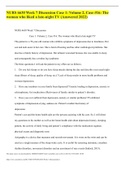Exam (elaborations)
NURS 6630 Week 7 Discussion Case 1: Volume 2, Case #16: The woman who liked a late-night TV (Answered 2022)
NURS 6630 Week 7 Discussion Case 1: Volume 2, Case #16: The woman who liked a late-night TV (Answered 2022)
NURS 6630 Week 7 Discussion
Case 1: Volume 2, Case #16: The woman who liked a late-night TV
The patient is a 70-year-old woman who exhibits symptoms of depression due to loneli...
[Show more]
Uploaded on
February 22, 2023
Number of pages
6
Written in
2022/2023
Type
Exam (elaborations)
Contains
Questions & answers
nurs 6630 week 7 discussion case 1 volume 2
case 16 the woman who liked a late night tv answered 2022 nurs 6630 week 7 discussion case 1 volume 2
case 16 the woman who liked a late night
All documents for this subject (1361)
$9.49
Also available in package deal from $27.49
100% satisfaction guarantee
Immediately available after payment
Both online and in PDF
No strings attached
Also available in package deal (1)
NURS 6630/NURS6630/nurs 6630 Weekly assignments (wks 1-10)Answered Latest From Fall 2022/2023 Distinction Level Assignments that has everything.
$ 150.38
$ 27.49
13 items
1. Other - (solved) nurs 6630 week 1 assignment: short answer assessment
2. Exam (elaborations) - (solution) nurs 6630 week 2 discussion: foundational neuroscience, latest 2021/2022.
3. Exam (elaborations) - (solved) nurs 6630 week 4 assignment: assessing and treating pediatric patients with ...
4. Exam (elaborations) - (answered) nurs 6630 week 5 assignment: assessing and treating patients with bipolar ...
5. Exam (elaborations) - (answered)assessing and treating patients with anxiety disorders / nurs 6630 week 6 a...
6. Exam (elaborations) - Nurs 6630 week 7 discussion case 1: volume 2, case #16: the woman who liked a late-ni...
7. Exam (elaborations) - (answered)nurs 6630/ nurs6630n discussion: treatment for a patient with a common cond...
8. Exam (elaborations) - (solved) nurs 6630 week 7 assignment: assessing and treating patients with psychosis ...
9. Exam (elaborations) - (answered) nurs 6630 week 8 assignment 1: short answer assessment 2022.
10. Exam (elaborations) - (solution) nurs 6630 week 8 assignment 2: assessing and treating patients with sleep/...
11. Exam (elaborations) - Seneca college pnr pnr 300/ pnr300 exam (solutions) latest spring 2022
12. Exam (elaborations) - (solution) nurs 6630 week 9 assessing and treating clients with attention deficit hyp...
13. Exam (elaborations) - (solution) nurs 6630 week 10 assignment: assessing and treating patients with impulsi...
Show more
NURS 6630 Week 7 Discussion Case 1: Volume 2, Case #16: The




